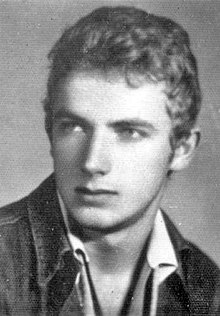Edward Stachura
Edward Jerzy Stachura ( [ˈɛdvard sta'xura] ; born August 18, 1937 in Charvieu , France , † July 24, 1979 in Warsaw ) was a Polish writer , poet and songwriter .
biography
Stachura was born into a family of Polish immigrants in Charvieu in the Isère department ( France ). He was the second child of Stanisław and Jadwiga Stachura.
In November 1948 the family returned to Poland and settled in Łazieniec near Aleksandrów Kujawski .
In the period 1957-1965 Stachura studied Romance studies at the Catholic University of Lublin and at the University of Warsaw .
He also translated from Spanish and French, a. a. Works by Jorge Luis Borges , Gaston Miron and Michel Deguy , and also wrote songs.
Stachura died on July 24, 1979 in Warsaw after a paranoid-schizophrenic episode by suicide.
The Stachura legend
Due to the non-conformist and uncompromisingly poetic orientation of his works, partly in the spirit of Hölderlin, Stachura was an idol of the alternative-oriented Polish youth of the 1980s throughout his life. Even if his prose and poetry were subsequently ascribed to the hippie ideology, Stachura's writing breaks the boundaries of any codified currents.
The openly apolitical work enabled Stachura to enjoy the privileges of an artist who was successful in the sense of the People's Republic in the reality of communist Poland at the time . The artist was generously subsidized through scholarships, trips abroad and contributions in kind (including housing, telephone).
Stachura sang his songs with an emphatically brittle voice, while he accompanied himself on the guitar with the help of simple chord progressions. The rare sound recordings of his performances have posthumously achieved collector value.
After his suicide, Stachura became a cult figure of the alternative youth culture in Poland. Poetry festivals under his name became pop events and the life plan of a “poet on the move” was adopted by thousands of young people as their own. Stachura's outfit - army jacket, jeans, backpack, sturdy shoes - became a symbol of like-minded people and a symbol of non-conformism.
Trivia
The posthumous complete edition of Stachura's works should originally have appeared in a cover made of jeans canvas. In view of the shortage economy in Poland in the 1980s, however, the five volumes were published in paperback format; after all, the envelopes were printed with jeans patterns.
Works
- Every dzień , 1962
- Dużo ognia , 1963
- Falując na wietrze , 1966
- Przystępuję do ciebie , 1968
- Po ogrodzie niech hula szarańcza , 1968
- Cała jaskrawość , 1969
- Siekierezada albo Zima leśnych ludzi , 1971
- Piosenki , 1973
- Piosenki , 1974
- Kropka nad ypsylonem 1975
- Opowiadania , 1977
- Się , 1977
- Missa pagana , 1978
- Fabula rasa , 1979
- Dużo ognia i tak dalej , 1978
- Oto , 1979
Film adaptations
- Siekierezada (1985), directed by Witold Leszczyński
literature
- Marian Buchowski: Edward Stachura - biografia i legenda. Kamerton, Opole 1993, ISBN 83-85971-00-9
- Waldemar Szyngwelski: Sted. Kalendarium życia i twórczości Edwarda Stachury. RYTM, Warszawa 2003
- Dariusz Pachocki: Stachura totalny. Lublin 2007
Web links
- Stachuriada ( Polish )
- Rzecz o Edwardzie Stachurze ( Memento from March 16, 2016 in the Internet Archive ) ( Polish )
- Edward Stachura Brama Grodzka - Teatr NN, ( Polish )
| personal data | |
|---|---|
| SURNAME | Stachura, Edward |
| ALTERNATIVE NAMES | Stachura, Edward Jerzy |
| BRIEF DESCRIPTION | Polish writer, poet and songwriter |
| DATE OF BIRTH | August 18, 1937 |
| PLACE OF BIRTH | Charvieu , France |
| DATE OF DEATH | July 24, 1979 |
| Place of death | Warsaw |
